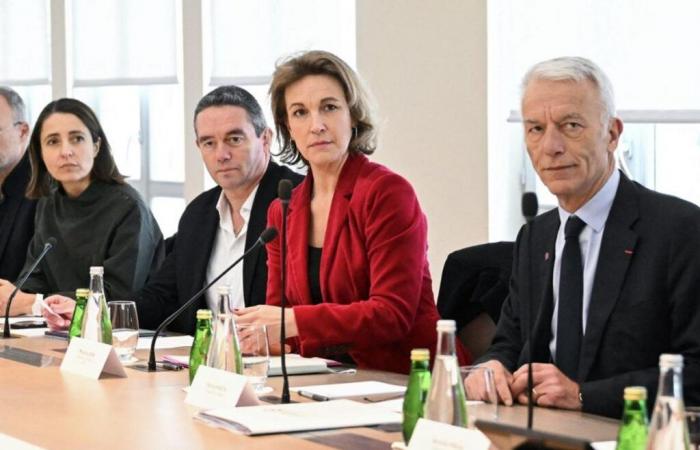Union representatives Sophie Binet (CGT), Yvan Ricordeau and Marylise Léon (CFDT), and Patrick Martin (Medef), at the Ministry of Labor, in Paris, January 17, 2025. BERTRAND GUAY / AFP
Read later
Google News
Share
Facebook
Twitter
E-mail
Copy link
Send
Reading time: 2 min.
Free access
Narrative
A first meeting took place between the social partners on the subject of pension reform, which François Bayrou wishes to put “under construction”.
Exercise in patience: almost two years after the first day of mobilization against pension reform, here it is finally, the “first response to this historic mobilization”observes Marylise Léon, general secretary of the CFDT, at the end of the meeting of more than two hours between social partners and government at the Ministry of Labor, this Friday, January 17. This was the first step of « conclave » wanted by François Bayrou for “return to construction” the highly contested 2023 reform. A consultation which must last until the spring, and during which everyone will be able to share “their areas of worry, of discomfort”declared in the introduction the Prime Minister, who also insisted on his ” trust ” in the outcome of this “unprecedented experience”.
Also read
Decryption
Pension reform restarted: what can we expect from this new negotiation?
Free access
Read later
For the trade union organizations, this first meeting was an opportunity to recall the central demand that they have been making since the unitary mobilization of 2023: the repeal of the postponement of the legal retirement age, from 62 to 64 years old. . “We have always been extremely clear: 64 years is no. We need to change the legal age”summarizes Marylise Léon, who also made proposals on the recognition of career inequalities between women and men and the arduousness in the calculation of retirement rights. “All the trade union organizations have called for an end to the 64 years. Today's meeting confirmed that the page on mobilization has not been turned and that pension reform cannot remain as it is.also comments Sophie Binet, general secretary of the CGT. “Me, I am not closed on the 64 years. This can change if we are made proposals that do not increase the cost of labor.”estimates for his part Michel Picon, of U2P, Union of local businesses.
At this stage of the discussions, it was mainly a question of method and scope: the work on the substance will only begin at the end of a costing mission entrusted to the Court of Auditors, which must submit its report on 19 February – this work is eagerly awaited by the unions, who contest the addition presented by François Bayrou in his general policy speech. “We will be able to bring out all the figures, expose them, discuss them, debate them and inform all citizens”rejoices François Hommeril (CFE-CGC). François Bayrou then hopes for an agreement between social partners for the “finer”.
“Salt in the cake”
Less emphatic overall than a Prime Minister who hopes that “optimism” surrounding these discussions could “restore optimism to French society” – euphoria of social dialogue – the union leaders still displayed, at the end of the meeting, a “will to succeed” (Marylise Léon), not to “not insult the future” (Cyril Chabanier, CFTC) ou de “coming out on top” (Dominique Corona, Unsa). The round table nevertheless “was an opportunity to see the extent of disagreements with employers, who reaffirmed their attachment to reform”according to Sophie Binet.
Among the subjects that could strain the discussions, François Bayrou's desire to deal at the same time with the public and private pension systems: the pension deficit for civil servants, highlighted by François Bayrou in his general policy speech , should it be covered by private schemes? No, according to most meeting participants. “The Prime Minister wants a global approach. But the two systems are not miscible”according to François Hommeril, who does not want “add salt to the cake”. “The direct commitment of Medef Porter[a] logically only within the scope of private sector pension schemes”also reacted Patrick Martin, the leader of the employers' union. He also defends the establishment of a capitalization plan, which is unthinkable for trade union organizations.
Also read
Tribune
Why are we being told nonsense about retirements?
Free access
Read later
Two points were, in any case, able to be decided: the participation following the work of the FSU and Solidaires, who were not invited to this first meeting (it brought together CFDT, CGT, FO, CFE-CGC and CFTC ; FNSEA and Unsa; Medef, CPME and U2P), but also a question of vocabulary which has plagued trade union organizations since the general policy speech: we do not say « conclave », but consultation.






